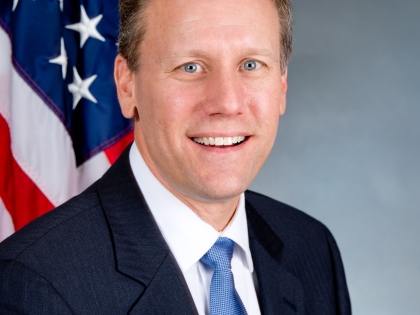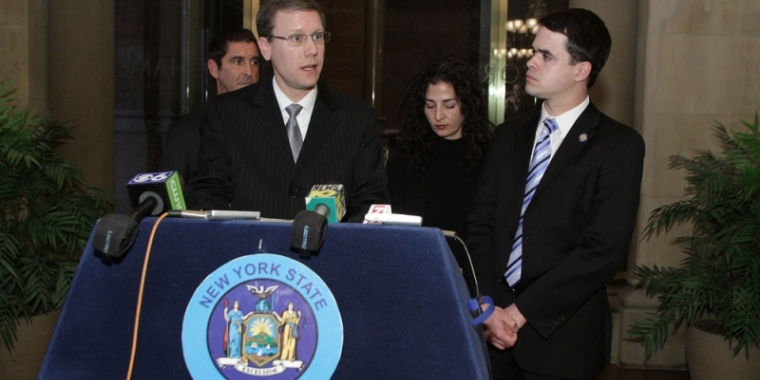
IDC Releases Mandate Relief Recommendations
David J. Valesky
January 19, 2011
-
ISSUE:
- Local Government

Proposals Level Local Gov't Playing Field, Lower Costs & Save Taxpayer Dollars
The Independent Democratic Conference today unveiled a series of common sense recommendations that will help local governments tackle state mandates, save money, and help ease the burden on taxpayers.
“Unfunded mandates put added pressure on local municipalities. In these difficult economic times, we need to evaluate each--large and small--to determine their usefulness and necessity,” Senator David J. Valesky, (D-Oneida), said.
These recommendations, which were made in consultation with the New York State Conference of Mayors and Municipal Officials (NYCOM), include helping municipalities save money by revamping laws that allow local governments enter into employee benefit cooperatives, cut down on the costs of prescription drug access, and enacting legislation to allow communities to hold building code scofflaws accountable.
“Local governments across New York are facing unprecedented fiscal challenges. Increased flexibility and the ability to reduce municipal expenses is essential to the prosperity of local governments and the State,” Peter Baynes, NYCOM Executive Director, said. “While the Conference of Mayors believes that the Legislature must take bold steps to finally reform the real cost drivers that plague local finances--particularly those in the workforce arena--we support efforts, such as this, to produce cost savings in other areas of municipal budgets as well.”
The proposals include:
Revamping laws governing the establishment of Inter-Municipal Employee Benefit Cooperatives
The IDC is drafting legislation that will simplify the process of having adjoining local governments form local benefit cooperatives and help reduce overall costs. These cooperatives allow municipalities to combine forces, consolidate duplicative services and manage employee healthcare, payroll and other administrative services.
This proposed legislation will also permit inter-municipal employee benefit managers to subscribe to lower cost health insurance products such as Healthy NY. Healthy NY is a comprehensive health insurance product that must be offered by all HMOs in New York to qualified sole-proprietors and small businesses. These products can be up to 7 percent cheaper when compared to other HMO products.
These cooperatives would also encourage higher participation rates in employee health benefit programs such as New York State Health Insurance Program (NYSHIP). They would additionally allow lower costs for employee benefits such as tax deferred retirement benefit plans, health flex plans, and tax deferred child care expenses.
The IDC is additionally developing legislation to allow local governments, many who do not participate in NYSHIP, to buy-in to its comparatively less expensive Empire prescription drug plan, without having to buy into the whole medical/hospital NYSHIP plan.
“Encouraging municipalities to pool their employees under one healthcare plan will allow them the benefit of more purchasing power, better rates, and lower costs that will be passed onto taxpayers,” Senator David Carlucci (D-Rockland) said.
Holding Building Code Scofflaws Accountable
The IDC will be introducing legislation to allow municipalities to attach unpaid building code and environmental fines to the offending property's tax bill.
“This legislation will end the current system where unscrupulous corporations, LLCs and other scofflaws ignore the rules and taxpayers pay the price of living in communities scarred by eyesores that drive down the value of their homes,” Senator Jeffrey D. Klein, (D-Bronx/ Westchester), said. “This bill will be a win-win that improves the quality of life for our constituents and grants relief to local governments.”
Currently, many communities are burdened with abandoned properties that are also the source of unpaid violations. Many of these building are owned by corporate entities, leaving local governments with little recourse if these owners ignore the fines.
In some communities, some building can have more than $100,000 worth of outstanding fines.
Under the IDC's proposed legislation, a local municipality, village or town, will be able to adopt and enact a local law that will allow them to convert a building code fine, property maintenance fine, or nuisance fine into a tax lien if it remains unpaid for a year.
The IDC additionally recommends that Governor Cuomo's Mandate Relief Team:
– Protect the Local Government Management Improvement Fund from Funding Raids
The fund was created in 1989 to help local governments comply with the mandated records management, and is funded by money collected by county clerks on every deed and mortgage filed in their offices. Over the years, the fund has been swept to fill budget gaps. This not only puts a strain on the ability of the municipality to comply with the mandate, but also misappropriates taxes paid by New Yorkers for access to these documents.
– Explore Remedies to the Current Lack of of Municipal Legal Cost Reimbursement
A plaintiff can sue any municipality as long as the statutory notice requirements are complied with. Oftentimes plaintiffs, in a rush to comply, file suit against the wrong municipality. Despite this mistake, municipalities are still obligated to expend money and resources defending the lawsuit.
While the desire of the IDC would not be to penalize plaintiffs who inadvertently sue the wrong municipal entity, it is the recommendation that the State should explore options that make it easier for municipalities to extricate themselves from these proceedings and allow courts the option of awarding fees where the wrongful commencement has been intentional.
“Everyone recognizes that the current system isn't working,” Senator Diane Savino, (D-Staten Island/ Brooklyn), said. “As members of the Independent Democratic Conference, we are committed finding solutions to get New York back on the right track. I believe that these common-sense proposals are part of a much needed step in that direction.”

